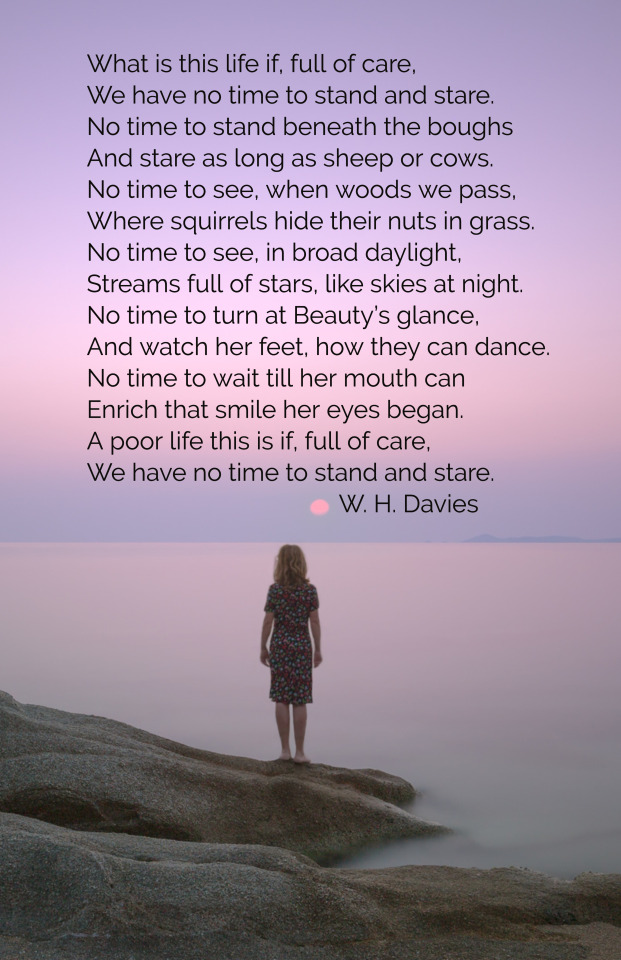#W.H. Davies
Text
Now shall I walk
Or shall I ride?
"Ride", Pleasure said;
"Walk", Joy replied.
Now what shall I --
Stay home or roam?
"Roam", Pleasure said;
And Joy -- "stay home."
Now shall I dance,
Or sit for dreams?
"Sit," answers Joy;
"Dance," Pleasure screams.
Which of ye two
Will kindest be?
Pleasure laughed sweet,
But Joy kissed me.
~ ‘The Best Friend’, by W.H. Davies
6 notes
·
View notes
Text

It was the Rainbow gave thee birth,
And left thee all her lovely hues.
~ William Henry Davies
The Kingfisher
#William Henry Davies#W. H. Davies#W.H. Davies#WH Davies#The Kingfisher#Rainbow#birth#lovely hues#lovely#hues#quote#quotes#poem#poetry#Saleh Badrah#Poetictouch
4 notes
·
View notes
Text

0 notes
Text
Leisure
What is this life, if, full of care
We have no time to stand and stare.
No time to stand beneath the boughs
And stare as long as sheep or cows.
No time to see, when woods we pass,
Where squirrels hide their nuts in grass.
No time to see, in broad daylight,
Streams full of stars, like skies at night.
No time to turn at Beauty's glance,
And watch her feet, how they can dance.
No time to wait…

View On WordPress
1 note
·
View note
Text
THIS DAY IN GAY HISTORY
based on: The White Crane Institute's 'Gay Wisdom', Gay Birthdays, Gay For Today, Famous GLBT, glbt-Gay Encylopedia, Today in Gay History, Wikipedia, and more … March 20
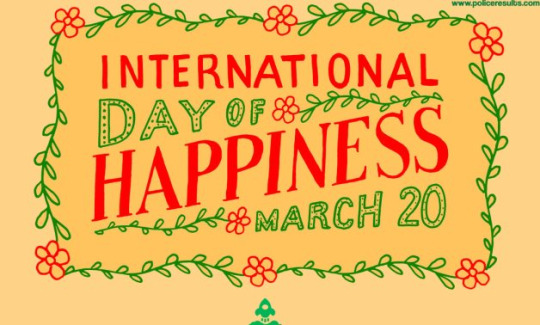

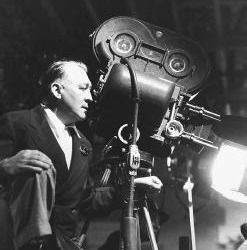
1891 – On this date the British singer, screenwriter, composer, actor and director Edmund Goulding was born (d.1959). Goulding is best remembered for directing cultured dramas and such as Grand Hotel (1932) with Greta Garbo and Joan Crawford, Dark Victory (1939) with Bette Davis, and The Razor's Edge (1946) with Gene Tierney and Tyrone Power. He also directed the classic film noir Nightmare Alley (1947) with Tyrone Power and Joan Blondell, and the action drama The Dawn Patrol. He was also a successful songwriter, composer, and producer.
There is a paradox to Goulding. His sensitivity to women's emotions brought him enduring success, as witnessed by his swooning melodramas, but his private life reflects a lack of sensitivity. Goulding was bisexual, with a decided taste for promiscuity and voyeurism. His sex parties and casting couch were notorious.
A 2004 biography of Goulding, Edmund Goulding's Dark Victory by Matthew Kennedy says that it was widely known in Hollywood that Goulding was bisexual, and hosted wild parties for all persuasions.
But he cannot be dismissed simply as a sex addict or sexual exploiter. For every excoriation of his morals, there are accounts of his loyalty to friends, generosity to family, gentlemanly manner on the set, and preternatural ability to bring out the best in his actors.

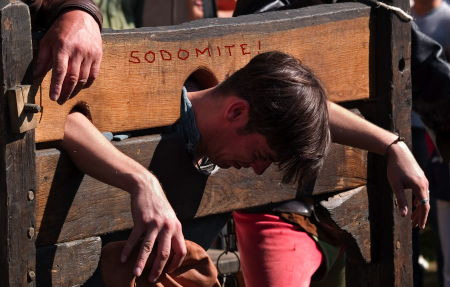
1905 – Delaware eliminates the pillory as a punishment for crime. Since 1852, those convicted of sodomy have been required to stand in the pillory for one hour prior to imprisonment.


1908 – Sir Michael Redgrave, English actor and director (d.1985). Father to the Redgrave acting dynasty, Redgrave was married to the actress Rachel Kempson for 50 years from 1935 until his death. Their children Vanessa (b. 1937), Corin (1939-2010) and Lynn Redgrave (1943-2010) and their grandchildren - Natasha (1963-2009), Joely Richardson (b. 1965) and Jemma are also involved in theatre or film as actors. His grandson Carlo Gabriel Nero is a screenwriter and film director
During the filming of Fritz Lang's Secret Beyond the Door... (1948), Redgrave met Bob Michell and they became lovers, Michell set up house close to the Redgraves, and he became a surrogate "uncle" to Redgrave's children (then aged 11, 9 and 5), who adored him. Michell later had children of his own, including a son he named Michael.
The 1996 BBC documentary film Michael Redgrave: My Father, narrated by his son Corin Redgrave, and based on his book of the same name, discusses Michael's bisexuality in some depth. Rachel Kempson recounts that, when she proposed to him, Redgrave said that there were "difficulties to do with his nature, and that he felt he ought not to marry". She said that she understood, it didn't matter and that she loved him. To this, Redgrave replied "Very well. If you're sure, we will".
During one of Corin's visits to Michael, the latter said "There is something I ought to tell you". Then, after a very long pause, "I am, to say the least of it, bisexual".
Corin helped his father in the writing of his last autobiography, and encouraged him to acknowledge his bisexuality in the book. Michael agreed to do so, but in the end he chose to remain silent about it.
A card was found among Redgrave's effects after his death. The card was signed "Tommy, Liverpool, January 1940", and on it were the words (quoted from W.H. Auden): "The world is love. Surely one fearless kiss would cure the million fevers".

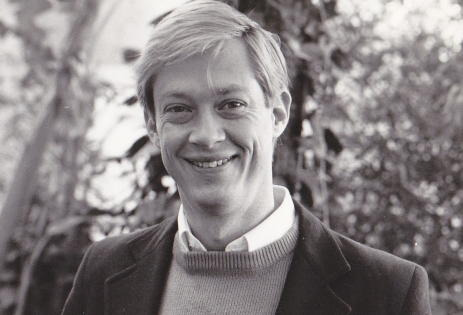
1947 – John Boswell, American historian (d.1994); A prominent historian and professor at Yale University, many of Boswell's studies focused on the issue of homosexuality and religion, specifically homosexuality and Christianity. Boswell was the author of the ground-breaking and controversial book Christianity, Social Tolerance and Homosexuality (1980), which, according to Chauncey et al (1989),
"offered a revolutionary interpretation of the Western tradition, arguing that the Roman Catholic Church had not condemned gay people throughout its history, but rather, at least until the twelfth century, had alternately evinced no special concern about homosexuality or actually celebrated love between men."
He is known primarily, however, as author of The Marriage of Likeness: Same- Sex Unions in Pre-Modern Europe (New York: Villard, 1994), in which he argues that the adelphopoiia liturgy was evidence that attitude of the Christian church towards homosexuality has actually changed over time, and that early Christians did on occasion accept same-sex relationships.
Rites of so-called "same-sex union" (Boswell's proposed translation) occur in ancient prayer-books of both the western and eastern churches. The rites of adelphopoiesis is Greek for "the making of brothers." Boswell, despite the fact that the rites explicitly state that the union involved in adelphopoiesis is a "spiritual" and not a "carnal" one, argued that these should be regarded as sexual unions similar to marriage.
This is a highly controversial point of Boswell's text, as other scholars have dissenting views of this interpretation, and believe that they were instead rites of becoming adopted brothers, or "blood brothers".
Boswell pointed out such evidence as an icon of two saints, Saints Sergius and Bacchus (at St. Catherine's on Mount Sinai), and drawings, such as one he interprets as depicting the wedding feast of Emperor Basil to his "partner", John. Boswell sees Jesus as fulfilling the role of the "pronubus" or in modern parallel, best man. Boswell made many detailed translations of these rites in Same-Sex Unions, and claimed that one mass same-sex wedding occurred only a couple of centuries ago in the Basilica of St. John Lateran, the cathedral seat of the Pope as Bishop of Rome.
Boswell died of complications from HIV-AIDS on December 24, 1994, at age 47.


1957 – The Illinois Supreme Court upholds the sodomy conviction of an optometrist with a male patient after very conflicting witness testimony. Did the witnesses need glasses?

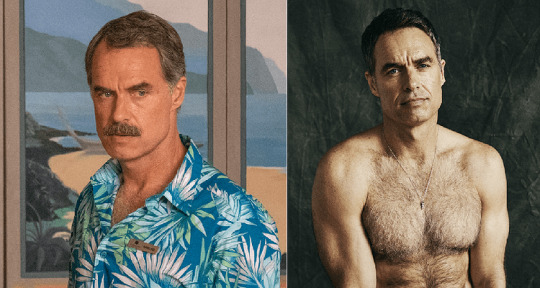
1971 – Murray Bartlett is an Australian actor. His roles include Dominic "Dom" Basaluzzo in the HBO comedy-drama series Looking, Michael "Mouse" Tolliver in the Netflix revival of Tales of the City, and Armond in the HBO satire comedy series The White Lotus. He is set to star in the upcoming television series adaptation of The Last of Us.
Bartlett was born in Sydney, Australia. At age four, his family moved to Perth, where he was raised.
Bartlett pursued an acting career in Australia for several years, including a role in the series headLand. In 1993, he played con man Luke Foster in Neighbours.
In 2000, Bartlett relocated to the United States. His first big break there came a few years later, when he was cast as a guest star in the HBO series Sex and the City. He also played D.K., John Crichton's best friend, in four episodes of the SciFi Channel series Farscape. In 2006, Bartlett toured with Hugh Jackman in the Australian touring company production of Jackman's Broadway hit The Boy From Oz.From March 2007 until the show's cancellation in September 2009, Bartlett was a cast member on the CBS daytime soap opera Guiding Light, where he played Cyrus Foley. He starred as Dominic "Dom" Basaluzzo in the HBO comedy-drama series Looking from 2014 to 2015, and then reprised his role in the series finale television film, Looking: The Movie in 2016. In 2017, he portrayed a recurring role in the musical drama series Nashville. Bartlett assumed the central role of Michael 'Mouse' Tolliver in the Netflix revival of Tales of the City.
In 2021, Bartlett starred in The White Lotus as Armond, the luxury resort manager and a recovering drug addict who has been "clean" for 5 years. Bartlett got the role through a self tape audition. For his portrayal, Bartlett received Screen Actors Guild, Critics' Choice, Independent Spirit and Australian Academy of Cinema and Television Arts nominations.
Bartlett came out as gay early in his career, saying, "I didn’t feel like I really had an alternative; I just never felt I could ever be anything but myself."


1976 – Alexander Chapman is a Canadian actor. He is best known for his role as Lydie-Anne in Lilies, for which he garnered a Genie Award nomination for Best Supporting Actor at the 17th Genie Awards.
Chapman, who has also performed as a drag queen under the name Titty Galore, has also had supporting roles in Space Cases, Welcome to Africville, Fig Trees, After Alice, Jesus of Montreal, Queer as Folk, Sugar, The Kids in the Hall, Tru Love and Murder in Passing, often but not always playing a drag queen or a transgender woman.
He has also performed extensively in stage roles, including in Canadian Stage's production of Angels in America.
Quebec-bred, Dawson College-trained, Toronto-based Chapman is best known for his Genie-nominated role in John Greyson’s Lilies (1996). As the lustful and lucid French aristocrat Lydie-Anne, the African-Canadian Chapman was cast against type but burned up the screen in his liaison with St-Sebastian wannabe Simon. Dana Inkster cast next him in a more subdued role as her community-building gay bartender in her short Welcome to Africville (1999). Also known by his nom de drag Titty Galore, Chapman was brought back by Greyson for a supporting role as South African activist Simon Nkoli in his Fig Trees (2003).


1989 – Xavier Dolan, born in Montreal, Quebec, sometimes credited as Xavier Dolan-Tadros, is a Québécois actor and filmmaker, the son of a teacher, Geneviève Dolan, and Quebec actor Manuel Tadros. Formerly a child actor in films such as J'en suis!, Le Marchand de sable and La Forteresse suspendue and television series such as Omertà, la loi du silence, Dolan attracted international attention when his first film as a director and screenwriter, J'ai tué ma mère (I Killed My Mother), won three awards from the Director's Fortnight program at the 2009 Cannes Film Festival.
J'ai tué ma mère has been sold to more than 20 countries.
After J'ai tué ma mère he directed his second feature film Les Amours Imaginaires (Heartbeats), which was financed privately. It follows the infatuation of two friends with the same mysterious young man. Inevitably, their friendship suffers. It premiered in the Un Certain Regard category at the 63e Festival de Cannes in May 2010, to a standing ovation, and won the top prize of the Official Competition at the Sydney Film Festival in June.
His third film, Laurence Anyways, about a transsexual, was selected to compete in the Un Certain Regard section at the 2012 Cannes Film Festival. Suzanne Clément's performance in the film won the section's award for Best Actress. The film received praise from critics but once again failed to find an audience.
His fourth film is an adaption of Michel Marc Bouchard's play Tom at the Farm (Tom à la ferme). It received its world premiere in the main competition section at the 70th Venice International Film Festival on 2 September 2013 and won the FIPRESCI award. Though Tom at the Farm played the festival circuits in 2013, it wasn't released in the United States until 2015.
Dolan's 2014 film, Mommy, shared the Jury Prize in the main competition section at the 2014 Cannes Film Festival with Jean-Luc Godard's film Goodbye to Language (Adieu au langage).
As of September 2009, the Québec-specific French-language dubbed version of the animated series South Park features Dolan as the voice of Stan. His voice work also included narrating the NFB's 2010 animated documentary Lipsett Diaries.
Dolan is gay, and has described J'ai tué ma mère, which he wrote, directed, and starred in, as being semi-autobiographical.

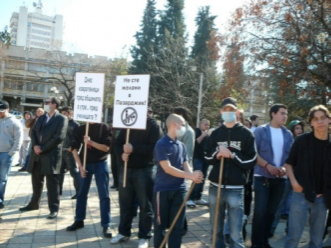
2010 – On this date in Bulgaria's capital Sofia, a tiny group of LGBT activists attempting to protest a new law banning open displays of homosexuality were surrounded and intimidated by almost 100 skinheads. As several of skin heads attacked the Gay rights activists they were immediately knocked down to the ground and arrested by the policemen guarding the rally, who were led personally by the head of the Pazardzhik Police Directorate, Commissar Stoyan Stoyanov. No-one was hurt during the skirmish. However, the anti-rally protestors shouted offensive slogans directed against the Gay rights activists such as "No one wants you, losers", "Out of Pazardzhik", "Go to Uganda, freaks".


11 notes
·
View notes
Text
"Leisure"
W.H. Davies (1871-1940)
What is this life if, full of care,
We have no time to stand and stare?—
No time to stand beneath the boughs,
And stare as long as sheep and cows:
No time to see, when woods we pass,
Where squirrels hide their nuts in grass:
No time to see, in broad daylight,
Streams full of stars, like skies at night:
No time to turn at Beauty's glance,
And watch her feet, how they can dance:
No time to wait till her mouth can
Enrich that smile her eyes began?
A poor life this if, full of care,
We have no time to stand and stare.

7 notes
·
View notes
Text

Now shall I walk
Or shall I ride?
"Ride", Pleasure said;
"Walk", Joy replied.
Now what shall I --
Stay home or roam?
"Roam", Pleasure said;
And Joy -- "stay home."
Now shall I dance,
Or sit for dreams?
"Sit," answers Joy;
"Dance," Pleasure screams.
Which of ye two
Will kindest be?
Pleasure laughed sweet,
But Joy kissed me.
~ ‘The Best Friend’, by W.H. Davies
65 notes
·
View notes
Text
Autumn Evening
by W.H. Davies
The shadows flickering, the daylight dying,
And I upon the old red sofa lying.
The great brown shadows leaping up the wall,
The sparrows twittering; and that is all.
I thought to send my soul to far-off lands,
Where fairies scamper on the windy sands,
Or where the autumn rain comes drumming down
On huddled roof in an enchanted town.
But O my sleepy soul, it will not roam,
It is too happy and too warm at home:
With just the shadows leaping on the wall,
The sparrows twittering; and that is all.
#poetic aesthetic#poetry#poems and quotes#poem#autumn aesthetic#fall#autumn#autumn poetry#w h davies#forgotten poetry
6 notes
·
View notes
Text
All media relevant to threshold 1:
Big History Khan Academy
World History Project Khan Academy
Big bang cosmology khan academy
Art History Khan Academy
OER website (big/world/worldAP)
Kurgeszact big bang content
Big history pdf threshold chart
OER Project Youtube
Great Courses Big History
A universe from nothing
Atom krauss
Dark matter kraus
Kraus greatest story
Dark matter great courses
Crash Course Big History
Bryan Cranston H2 Big History docu
David christian bibliography
Bob bain bibliography
A most improbable journey
Joseph silk big bang
Joseph silk brief history
Joseph silk infinite cosmos
Cosmic enigmas joseph silk
Khan brief intro to physics (+chem library)
Khan brief intro to chemistry(+phys library)
Middle school physics khan
7th grade bridge course science khan
Great courses 12 scientific
Creation stories of the ancient world
Creation myths of primitive america
Crash course chemistry
Crash course big bang cosmology
Crash course astronomy history of universe
Crash course physic cosmology
Crash course world myth creation myths
Big history 2 lmao
Oer youtube intro to sciences
How to make an apple feom scratch
The illustrated theory of everything
A briefer history of time
Origins tyson
Cosmos sagan
Where did the jniverse come from
The order if time carlo
Bibliography
Suggested reading list for books on the Big Bang, Dark Matter, etc.
Popular magazine articles
Peebles, P.J.E., Schramm, D.N., Turner, E.L., & Kron, R.G., The case for the relativistic hot Big Bang cosmology, Nature, 352(1991)769
Gribbon, J., Dark matter and the universe, Science, Inside Science, 19 March 1994
Monda, R., Shedding light on dark matter, Astronomy, Feb 1992, p.45
Rubin, V., Special Issue of SciAm, 1998.
Popular books
Barrow, J.D. Theories of Everything, Ballantine, N.Y., 1992.
Barrow, J. D. and Silk,J., The Left Hand of Creation, Basic.
Carrigan, R.A. and Trower, W.P., Particle Physics in the Cosmos, Readings from Scientific American, Freeman, 1989.
Carrigan, R.A. and Trower, W.P., Particles and Forces: At the Heart of the Matter, Readings from Scientific American, Freeman, 1990.
Davies, P.C.W., The Edge of Infinity, Dent, London, 1981.
Davies P.C.W. and Brown, J., Superstrings: a theory of everything, Cambridge UP, Cambridge, 1988.
Ferris, T., Coming of Age in the Milky Way, The Bodley Head, London, 1988; The Red Limit, Bantam.
Gribbin, J. and Rees, M.J., Cosmic Coincidences: Dark Matter, Mankind, and Anthropic Cosmology, Bantam, NY, 1989.
Gribbin, J., In Search of the Big Bang, Bantam.
Hawking, S.W., A Brief History of Time, Bantam, NY, 1988.
Kaufmann, W. 1977. The Cosmic Frontiers of General Relativity, Little Brown, Boston, 1977.
Krauss, L. The Fifth Essence: the search for dark matter in the universe, Basic Books, NY, 1989.
Lederman, L. and Schramm, D.N., From Quarks to the Cosmos, Scientific American Library, W.H. Freeman, 1989.
Riordan, M. and Schramm, D. The Shadows of Creation, Freeman, 1991.
Pagels, H., Perfect Symmetry, M. Joseph, London, 1985.
Silk, J., The Big Bang, (2nd ed.), W.H. Freeman, San Francisco, 1988.
Weinberg, S., Dreams of an Ultimate Theory, Basic Books NY, 1993.
Zee, A., Fearful Symmetry, Macmillan, NY, 1986.
Books intermediate in difficulty, but non-mathematical
Barrow, J.D., The World Within the World, Oxford U.P., Oxford, 1988.
Berendzen, R., Hart, R. and Seeley, D., Man Discovers the Galaxies, Science History Publications, NY 1976.
Close, F., The Cosmic Onion, Heinemann, London, 1983.
Cornell, J., ed. Bubbles, Voids and Bumps in the New Cosmology, Cambridge UP, Cambridge, 1989.
Davies, P.C.W., ed. The New Physics, Cambridge UP, Cambridge, 1989.
Drees, W., Beyond the Big Bang: Quantum Cosmology and God, Open Court, La Salle, 1990.
Harrison, E., Cosmology: The Science of the Universe, C. U. P., 1981.
Longair, M., The Origins of the Universe, Cambridge UP, Cambridge, 1990.
Luminet, J-P., Black Holes, Cambridge UP, Cambridge 1993.
Peat, F.D., Superstrings and the Search for a Theory of Everything, Contemporary Books, Chicago, 1988.
Shu, F. The Physical Universe, Mill Valley, Calif., University Science Books, 1982
Tayler, R.J., Hidden Matter, Ellis Horwood, Chichester, 1991.
Weinberg, S., The First Three Minutes, Basic Books, NY, 1977.
Technical books, for people with some physical science background
Barrow, J.D. and Tipler, F.J., The Anthropic Cosmological Principle, Oxford UP, Oxford and NY, 1986.
Kolb, E. and Turner, M.S., The Early Universe, Addison Wesley, Redwood City Calif., 1990.
Linde A., Particle Physics and Inflationary Cosmology, Harwood, NY, 1990.
Narlikar, J.V., Introduction to Cosmology (2nd edition), Cambridge UP, Cambridge, 1993.
Padmanabhan, T., Structure Formation in the Universe, Cambridge UP, Cambridge, 1993
Peebles, P.J., Principles of Physical Cosmology, Princeton UP, Princeton NJ, 1993.
Tryon, E.P., Cosmic Inflation, in The Encyclopedia of Physical Science and Technology, vol.3, pp. 709-43, Academic Press, NY, 1987.
Vilenkin, A. and Shellard, E.P.S., Cosmic Strings and Other Topological Defects, Cambridge UP, Cambridge, 1993.
https://w.astro.berkeley.edu/~mwhite/siteindex.html
How to read:
The level before must be satisfied to qualify for the next.
1. Elementary Reading
Keep a notepad on hand for all words you do not recognise. Be sure all is within your grasp w application of effort.
2. Inspectional Reading
Look at the author’s sales pitch even give it a try
There are two sub-types of inspectional reading/watching:
Systematic skimming for books— This is meant to be a quick check of the book by (1) reading the preface; (2) studying the table of contents; (3) checking the index; and (4) reading the inside jacket. This should give you sufficient knowledge to understand the chapters in the book, pivotal to the author’s argument. Dip in here and there, but never with more than a paragraph or two. Skimming helps you reach to a decision point: Does this book deserve more of my time and attention? If not, you put it down.
Systematic skimming for videos: Skim the transcript first, The skim should be very quick and give you the gist of what the video is
about. You should be looking at the title, thumbnails, pictures, and first few seconds of the video.
Superficial reading— This is when you just read. Don’t ponder the argument, don’t look things up, don’t write in the margins. If you don’t understand something, move on. What you gain from this quick read will help you later when you go back and put more effort into reading. Same with videos go ahead and watch once sit back. You now come to another decision point. Now that you have a better understanding of the book’s contents and its structure, do you want to understand more than the gist?
Sometimes that’s all we want or need. But sometimes we want more. Sometimes we want to understand. We cannot decide if a work is good or bad at this level- only relevant to our frames or not.
3. Analytical Reading
Analytical reading is a thorough reading, properly digesting the material taking advantage of slow methodical.
At this point, you start to engage your mind and dig into the work required to understand what’s being said. [The blog I stole this from) highly recommends you use marginalia to converse with the author.
There are four rules to Analytical Reading
Classify the book according to kind and subject matter.
State what the whole book is about with the utmost brevity.
Enumerate its major parts in their order and relation, and outline these parts as you have outlined the whole.
Define the problem or problems the author is trying to solve.
You’ll probably notice that while those sound pretty easy, they involve a lot of work. Luckily the inspectional reading you’ve already done has primed you for this.
After an inspectional read, you will understand the book and the author’s views.
But that doesn’t mean you’ll understand the broader subject. To do that, you need to use comparative reading to synthesize knowledge from several books on the same subject.
For videos, review
the questions you will be assigned to answer (a good habit to use in reading, too!). This pre-viewing strategy will
help you know what to look and listen for as you watch the video. Because some videos move quickly
and contain a lot of information, it will help you a lot if you know what to listen for.
The second time, pause the video each time you find an answer so you can write the answer down. Keep
in mind that when you watch the video, it is a good idea to write down any vocab you read or hear that is
unfamiliar to you.
4. Syntopical Reading
This is also known as comparative reading, and it represents the most demanding and difficult reading of all. Syntopical Reading involves reading many books on the same subject and comparing and contrasting ideas, vocabulary, and arguments.
This task is undertaken by identifying relevant passages, translating the terminology, framing and ordering the questions that need answering, defining the issues, and having a conversation with the responses.
The goal is not to achieve an overall understanding of any particular book, but rather to understand the subject and develop a deep fluency.
This is all about identifying and filling in your knowledge gaps.
There are five steps to syntopical reading:
Finding the Relevant Passages — You need to find the right books and then the passages that are most relevant to filling your needs. So the first step is an inspectional reading of all the works that you have identified as relevant.
Bringing the Author to Terms — In analytical reading, you must identify the keywords and how they are used by the author. This is fairly straightforward. The process becomes more complicated now as each author has probably used different terms and concepts to frame their argument. Now the onus is on you to establish the terms. Rather than using the author’s language, you must use your own. In short, this is an exercise in translation and synthesis.
Getting the Questions Clear — Rather than focus on the problems the author is trying to solve, you need to focus on the questions that you want answered. Just as we must establish our own terminology, so too must we establish our own propositions by shedding light on our problems to which the authors provide answers. It’s important to frame the questions in such a way that all or most of the authors can be interpreted as providing answers. Sometimes we might not get an answer to our questions because they might not have been seen as questions by the authors.
After skimming the video transcript on Khan and watching it for key ideas and content, you’ll think about and answer
some bigger picture questions that will help reinforce why this video is important to what you are learning,
and how it connects to other content you’ve studied.
Defining the Issues — If you’ve asked a clear question to which there are multiple answers then an issue has been defined. Opposing answers, now translated into your terms, must be ordered in relation to one another. Understanding multiple perspectives within an issue helps you form an intelligent opinion.
Analyzing the Discussion — It’s presumptuous to expect we’ll find a single unchallenged truth to any of our questions. Our answer is the conflict of opposing answers. The value is the discussion you have with these authors. You can now have an informed opinion.
-Becoming a Demanding Reader-
Reading is all about asking the right questions in the right order and seeking answers.
There are four main questions you need to ask of every book:
What is this book about?
What is being said in detail, and how?
Is this book true in whole or in part?
What of it?
0 notes
Text

1 note
·
View note
Note
hii :)
thank you, i'll try my best
WHAT is this life if, full of care,
We have no time to stand and stare?—
No time to stand beneath the boughs,
And stare as long as sheep and cows:
No time to see, when woods we pass,
Where squirrels hide their nuts in grass:
No time to see, in broad daylight,
Streams full of stars, like skies at night:
No time to turn at Beauty's glance,
And watch her feet, how they can dance:
No time to wait till her mouth can
Enrich that smile her eyes began?
A poor life this if, full of care,
We have no time to stand and stare.
(leisure by w.h. davies)
- brown eyes💙
hi!
I don’t think that I’ve been in love as such,
Although I liked a few folk pretty well.
Love must be vaster than my smiles or touch.
For brave men died and empires rose and fell
For love: girls followed boys to foreign lands
And men have followed women into Hell.
In plays and poems someone understands
There’s something makes us more than blood and bone
And more than biological demands…
For me, love’s like the wind, unseen, unknown.
I see the trees are bending where it’s been,
I know that it leaves wreckage where it’s blown.
I really don’t know what “I love you” means.
I think it means “Don’t leave me here alone.”
(sonnet by neil gaiman)
1 note
·
View note
Text
What is this life if, full of care,
We have no time to stand and stare?—
No time to stand beneath the boughs,
And stare as long as sheep and cows:
No time to see, when woods we pass,
Where squirrels hide their nuts in grass:
No time to see, in broad daylight,
Streams full of stars, like skies at night:
No time to turn at Beauty's glance,
And watch her feet, how they can dance:
No time to wait till her mouth can
Enrich that smile her eyes began?
A poor life this if, full of care,
We have no time to stand and stare.
"Leisure" by W.H Davies
#leisure#W H Davies#take some time for yourself and get lost among nature#one of the poems of all time#poetry
1 note
·
View note
Text
14th April
The Woods and Banks by W.H. Davies
The return of cuckoos to the U.K. supposedly takes place today, St Tiburtius’ Day, or Cuckoo Day. Davies’ poem celebrates the migrants’ return.

Source: The Guardian
The Woods and Banks
The woods and banks of England now,
Late coppered with dead leaves and old,
Have made the early violets grow,
And bulge with knots of primrose gold.
Hear how the blackbird flutes away,
Whose music scorns to sleep at night:
Hear how the cuckoo shouts all day
For echoes - to the world’s delight:
Hullo, you imp of wonder, you -
Where are you now, cuckoo? Cuckoo?
Cuckoos are perhaps the archetypal bird of springtime. Many love its distinctive call as presaging the long awaited return of warm weather, but its egg laying habits are entirely parasitic.
1 note
·
View note
Text
I had Ambition, by which sin
The Angels fell;
I climbed and, step by step, O Lord,
Ascended into Hell
-- W.H. Davies, (Ambition)
0 notes

